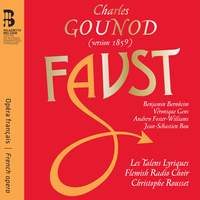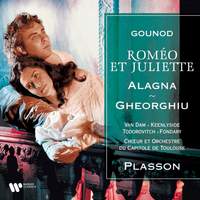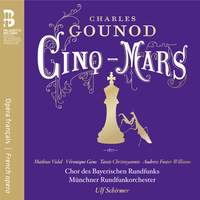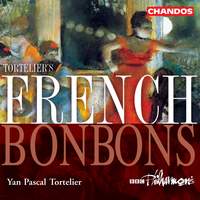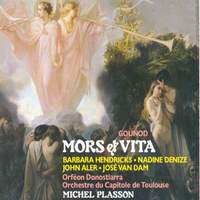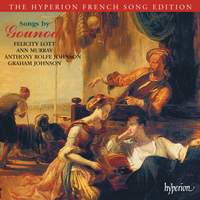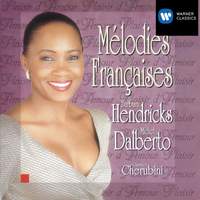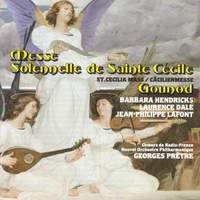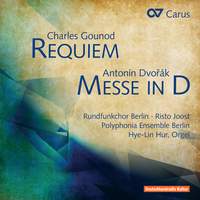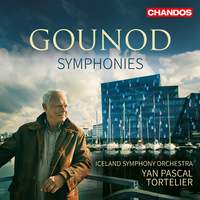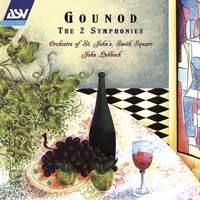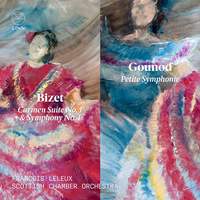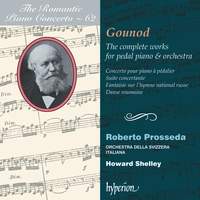Composer Guides,
Charles-François Gounod
Early experiences at the Théâtre-Italien stoked the fires of Gounod's interest in music as a career, and after a few years of private study under Anton Reicha he entered the Paris Conservatoire. There his teachers included some of the greatest names of the age - Halévy and Paer in particular - yet it was his meeting with his near-contemporary Berlioz that most inspired him.
For so many composers and artists of the French Romantic period, true success was locked away behind the Prix de Rome. Gounod's father had won a second prize in the Prix for his paintings, but the son eventually eclipsed him, with the cantata Fernand bringing him the top honours. Success in this tightly-fought competition did not come easily - Gounod had taken three attempts before earning his triumph.
The subsidised travelling and studying that came with the Prix de Rome brought him into contact with the singer Pauline Viardot and the composer-pianist Fanny Hensel, as well as the literature of Goethe, whose Faust was to be the basis of perhaps Gounod's most lastingly successful work.
Gounod was a deeply religious man for much of his life, and his travels likewise nourished this aspect of his development - particularly a stay in Rome, where he became acquainted with the polyphony of Palestrina. Sacred works, large and small, were a regular feature of his compositional output.
Through his friendship with Viardot (rumours abounded, and continue to do so, that the two were romantically involved) Gounod began to move towards composing operas. Early attempts such as Sapho and La Nonne sanglante had mixed success, and clique-based musical politics was as much a factor in their lukewarm reception as anything to do with their musical merit. A collaboration with librettists Jules Barbier and Michel Carré brought more success - first with the opéra comique Le Médecin malgré lui and then, a few years later, with Faust. We might expect the latter to have been a smash-hit, but in fact it took some time to work its way into the public's heart. However, once it had become established in the repertoire it became a firm favourite, and remains a staple to this day.

Other operas followed - some more successful than others (including an attempt to jump on the satirical-comedy bandwagon established by Offenbach's Orphée aux enfers), but the 1860s closed with the hugely popular Roméo et Juliette.
At this point factors beyond Gounod's control intervened to radically redirect the course of his life - the Prussian invasion of France prompted him to flee to London (and indeed his former home on the outskirts of Paris was destroyed by the Prussian advance). There he supported himself by composing religious and devotional solo vocal music, in collaboration with the singer Georgina Weldon - about whom, again, rumours swirled without much conclusive evidence.
After Gounod returned to France he found that his place at the head of the musical community was gradually being eclipsed; the younger generation (chiefly Bizet, Chabrier, Fauré, Massenet and of course Saint-Saëns) were fast making a name for themselves. Gounod does not seem to have been particularly concerned by this, and supported his younger colleagues' efforts. His own compositions continued to pour forth, with historically-themed operas and several large-scale choral works. The tradition of massed choral singing in England was at its height during this period, and works such as La Rédemption and Mors et vita, though rarely heard or even recorded today, were hugely popular among choral societies.
Gounod died in 1893, aged 75. Following his death his music began to fall out of fashion - often described a little dismissively as 'charming' and seen as overly sentimental. Those were arguably precisely the qualities that had made him so acclaimed throughout his career - but they now became concepts that could be used against him as tastes evolved, and in particular as European culture fell into a period of existential soul-searching after the First World War. Nevertheless, his success in his own time and his impact on the later generation of French composers would be difficult to overstate.


Charles-François Gounod (1818-1893)
Curated by David Smith
A selection of some of the best recordings of music by the French Romantic composer, known for his operas, sacred music and songs. 3 hours 23 minutes
Benjamin Bernheim (Faust), Véronique Gens (Marguerite), Andrew Foster-Williams (Méphistophélès), Jean-Sébastien Bou (Valentin), Juliette Mars (Siebel), Ingrid Perruche (Marthe), Anas Séguin (Wagner/Un mendiant), Les Talens Lyriques, Flemish Radio Choir, Christophe Rousset
Available Formats: 3 CDs + Book, MP3, FLAC, Hi-Res FLAC
Roberto Alagna, Angela Gheorghiu, José van Dam, Marie-Ange Todorovitch, Simon Keenlyside, Alain Fondary, Claire Larcher, Orchestre & Choeur du Capitole de Toulouse, Michel Plasson
Available Formats: MP3, FLAC
Mathias Vidal (Le Marquis de Cinq-Mars), Véronique Gens (La Princesse Marie de Gonzague), Tassis Christoyannis (Le Conseiller de Thou), Andrew Foster-Williams (Le Père Joseph), André Heyboer (Le Vicomte de Fontrailles), Norma Nahoun (Marion Delorme), Marie Lenormand (Ninon de L’Enclos, Un Berger), Munich Radio Orchestra, Chor des Bayerischen Rundfunks, Ulf Schirmer
Available Formats: 2 CDs + Book, MP3, FLAC, Hi-Res FLAC
Carolyn Sampson (soprano), Joseph Middleton (piano)
Available Formats: SACD, MP3, FLAC, Hi-Res FLAC
Peter Dixon (cello), Yuri Torchinsky (violin), BBC Philharmonic, Royal Liverpool Philharmonic Choir, Yan Pascal Tortelier
Available Formats: CD, MP3, FLAC, Hi-Res FLAC
Barbara Hendricks (soprano), Nadine Denize (mezzo), John Aler (tenor), José van Dam (bass-baritone), Orchestre du Capitole de Toulouse & Orféon Donostiarra, Michel Plasson
Available Format: 2 CDs
Dame Felicity Lott (soprano), Ann Murray (mezzo soprano), Anthony Rolfe Johnson (tenor), Graham Johnson (piano)
Available Formats: 2 CDs, MP3, FLAC
Barbara Hendricks (soprano), Michel Dalberto (piano)
Available Formats: MP3, FLAC
Elīna Garanča (mezzo-soprano), Latvian Radio Choir, Deutsche Radio Philharmonie Saarbrücken, Karel Mark Chichon
Available Formats: CD, MP3, FLAC, Hi-Res FLAC
Barbara Hendricks, Laurence Dale, Jean-Philippe Lafont, Choeur de Radio-France, Nouvel Orchestre Philharmonique, Georges Prêtre
Available Formats: CD, MP3, FLAC
Anne Bretschneider, Christine Lichtenberg, Georg Witt, Fundfunkchor Berlin & Polyphonia Ensemble Berlin, Risto Joost
Available Formats: CD, MP3, FLAC
Iceland Symphony Orchestra, Yan Pascal Tortelier
Available Formats: SACD, MP3, FLAC, Hi-Res FLAC
Orchestra of St. John's Smith Square, John Lubbock
Available Format: Presto CD
Scottish Chamber Orchestra, François Leleux
Available Formats: CD, MP3, FLAC, Hi-Res FLAC
Roberto Prosseda (pedal piano), Orchestra della Svizzera Italiana, Howard Shelley
Available Formats: CD, MP3, FLAC, Hi-Res FLAC



